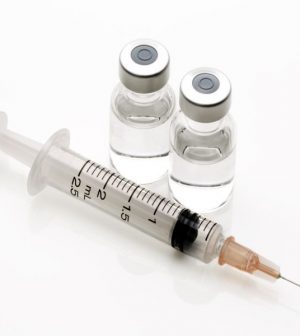- Recognizing the Signs of Hypothyroidism
- 10 Strategies to Overcome Insomnia
- Could Artificial Sweeteners Be Aging the Brain Faster?
- Techniques for Soothing Your Nervous System
- Does the Water in Your House Smell Funny? Here’s Why
- Can a Daily Dose of Apple Cider Vinegar Actually Aid Weight Loss?
- 6 Health Beverages That Can Actually Spike Your Blood Sugar
- Treatment Options for Social Anxiety Disorder
- Understanding the Connection Between Anxiety and Depression
- How Daily Prunes Can Influence Cholesterol and Inflammation
Moderna COVID Vaccine Offers Protection for at Least 6 Months: Study

There’s good news for the millions of Americans who’ve already received a dose or two of Moderna’s COVID-19 vaccine: New research shows the vaccine should protect against illness for at least six months.
The new study tracked 33 participants in the trials that led to the vaccine’s approval. Six months after having received their second vaccine dose, “antibody activity remained high in all age groups,” according to a team led by Nicole Doria-Rose of the U.S. National Institute of Allergy and Infectious Diseases (NIAID).
Her group published their findings April 6 in the New England Journal of Medicine.
The reassuring results follow on similar findings for the other major two-dose vaccine included in the U.S. vaccine rollout, made by Pfizer/BioNTech. Trial results released April 1 by the companies found that their vaccine remains more than 91% effective six months after people get their second dose.
The new results from Moderna are based on 33 people ranging in age from 18 to older than 71. The study found that while everyone maintained high levels of infection-fighting immune system antibodies in blood samples, levels did seem to fall according to the increasing age of participants.
For example, while levels (“titers”) of antibodies averaged over 92,000 in vaccinated people aged 18 to 55 at six months after full immunization, they dropped to an average of about 62,000 in people aged 56 to 70, and to just over 49,000 in people aged 71 and older.
Still, all participants “had detectable [antibody] activity” six months on, and that was found on three distinct types of blood tests, the NIAID-led team said.
Dr. Amesh Adalja is an expert in virology and senior scholar at the Johns Hopkins Center for Health Security, in Baltimore. Reviewing the new report, he said that immunity might last even longer than the six-month period the researchers were able to report on now.
“As companies conduct natural history studies to look at the duration of antibodies and other correlates of immunity in coronavirus-vaccinated individuals, it is expected that we will see that immunity lasts for a considerable amount of time,” Adalja said. “As the duration of the studies increases, I anticipate we will find that immunity lasts for over a year.”
In the meantime, Doria-Rose and her colleagues said that “ongoing studies are monitoring immune responses beyond six months as well as determining the effect of a booster dose to extend the duration and breadth of activity against emerging viral variants.”
More information
There’s more on COVID-19 vaccination at the U.S. Centers for Disease Control and Prevention.
SOURCES: New England Journal of Medicine, April 6, 2021; Amesh Adalja, MD, senior scholar, Johns Hopkins Center for Health Security, Baltimore
Source: HealthDay
Copyright © 2026 HealthDay. All rights reserved.










